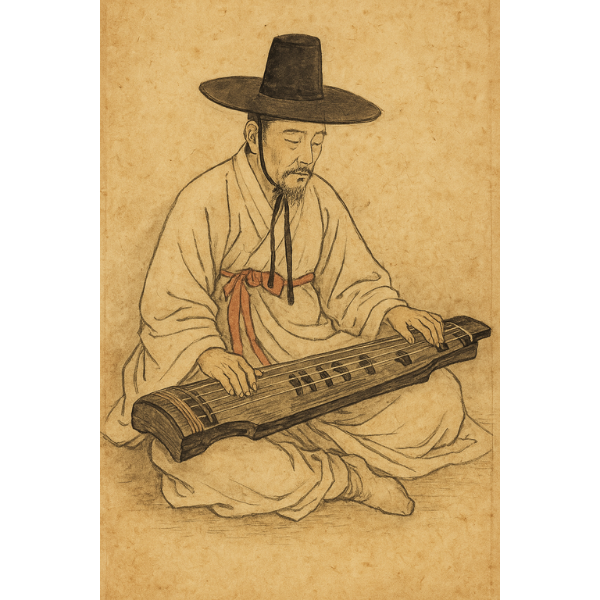the man who severed his heartstrings
a Korean folktale on lost potential and the tragedy of self-doubt
Long ago in Korea, there was once a man who lived a quiet life but played the geomungo (거문고; guh·mun·go) — a traditional six-stringed zither, with extraordinary beauty. His music was reflective of his soul and aspirations; he loved to play, and dreamed to perform for others.
For the sake of the story, let’s call him Junho (my first paid subscriber!).
The people surrounding Junho however, scoffed with an impassioned sense of distaste:
“Who wants to listen to the geomungo?!”
“You can’t make a living doing this”
Behind Junho’s back - some laughed, and he even heard a deep silence from others — feeling their dejection that had formed from worry and fear. Little by little, their words wore him down.
One day, the shame had become too heavy to bear and his callused fingertips reached for a blade… and he cut all the strings of his beloved instrument. He swore to never play again.
Years passed.
Suddenly, rumours flooded his town: the royal court announced a search for the kingdom’s greatest geomungo player. The King sought to find the most moving piece to be performed infront of him, and promised to grant the highest title and lifelong honour.
When Junho heard the news — his heart sank.
He had once been more than capable: and this was a chance to show the world his passion he had lived a lifetime for.
Though he had long since silenced himself.
The man who severed his heartstrings. With no instrument to play, without his medium — all he could do was helplessly watch his chance pass by.
He lived the rest of his life in quiet, slow-burning regret.
han honours life’s contradictions — and our very human capacity to suffer and endure.
The thing is — no one told him to stop.
Just like Junho (last use of your name here, Junho — I hope you enjoyed!), you know exactly who you are, what you love and what you mean to say or do. Yet you may stop one day because your self-perception becomes distorted by other people’s judgements, opinions, misunderstandings or personal projections.
Seeking external validation to resolve self-doubt is simply the greatest devastation. Outside voices become clearer than your own and the dismissal from others begin to rewrite your self-worth.
This societal pressure still destroys people today — maybe someone close to you, or maybe even you. You must know when a decision is truly yours, or a faltering response to negative reactions or non-reaction.
Sometimes we blame the world.
Sometimes we blame ourselves.
But regret is the scariest thing of all.
So if this piece reminded you of something you've put away, or someone you’ve lost faith in — let it also remind you:
Your voice is the only one to consider when it comes to what you love, and how you live your life.
In the end, it is self-perception that carries the greatest weight and meaning, so stick it through and your wildest dreams may no longer just live in your head — but in reality.
Perhaps if the man who severed his heartstrings mustered up the courage to simply try once more — he may have just succeeded too.
If any section of this article resonates, feel free to subscribe, reply, or simply sit with it.
This is only the beginning.
And so I must ask…
“이 한을 누구에게 말하리오”
To whom can I speak of this han?





